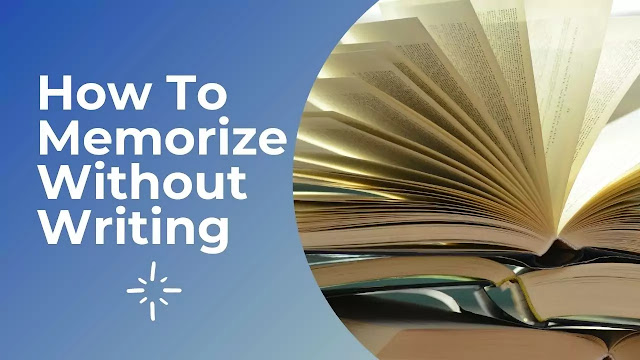Did you know that over 90% of all information transmitted to the brain is visual? That's why having a strong memory can be so important, especially in today's world. So while some people swear by their note taking abilities during classes or meetings, others prefer to use visualization techniques to help them recall important information after they've left the meeting room.
Humans have been remembering and writing things down since the beginning of time. From cave walls to paper, we've evolved from scratching symbols into crude tablets to storing data in silicon chips. But there's something new happening now: we're forgetting how to memorize things. We're giving up on rote learning and turning back to nature, tapping into skills that humans had for thousands of years before writing was even an option. You may think that schools are just teaching students how to take notes.
How To Remember Without Writing
Spend a few minutes writing down the key points of what you want to remember. Then, turn off your computer and TV and try to memorize everything again. Write down the information in a notebook or on an index card and refer to it when needed.
What happened? You memorized more than if you had just reviewed the material in your normal way! This is because you force yourself to think about all of the information in different ways when you're trying to recall rather than just reading.
What is memory?
Memory is the process of storing and recalling information. In other words, it is a method for organizing and retaining information about past events. Without memory, we wouldn’t be able to store new information or recall information from our past experiences. Both tasks are critical to helping us make sense of the world around us.
The study of memory is a very large and complex subject. There are many different types of memory storage systems in the brain, and it’s believed that there is a connection between all of them. There isn’t just one type of memory storage system in the brain;
The importance of memorization
Memorization is one of the most important skills in life. It can be applied to almost every area of life, including health, home management, productivity, relationships, and even business.
Why is memorization so powerful? Because it trains the brain to have a more efficient memory process. If you are not good at memorization yet, practice makes perfect. Anyone can become skilled at memorization if they are willing to put in the effort.
The importance of memorization in education has been on the decline for decades now. No longer are students expected to commit information to memory. Instead, they are encouraged to find creative ways of remembering subjects without having to write them down or say them aloud. However, this is a mistake. History is littered with examples of people who have achieved great success by committing their knowledge to memory.
How Can I Memorize Without Writing?
It is possible to learn how to memorize without writing, through a process known as mnemonics. Mnemonics is the science of improving one's memory skills and it can be quite useful when trying to sharpen your mind and become more focused.
How do you remember?
Starting with the obvious - if you want to remember something, you must first pay attention to it. Our brains can only hold a limited number of items in short-term memory (meaning we can only really remember about seven things at once), so it’s important that you limit your distractions and focus.
Final Words:
You can’t memorize what you don’t write down. Writing helps you stay focused and retain information, but it should be used as a tool rather than a crutch.
Writing is an active process that engages both hemispheres of your brain. It helps you to connect concepts into related groups, which makes the information easier to remember. Our memories are not perfect, but writing forces us to pay attention to the content we are trying to learn. If you don’t write something down, there is a chance that it will never make it into your memory.
Conclusion: To memorize a passage without writing, first you need to understand the text. This means going over it multiple times until you know it word for word. Once you’ve done this, turn off your phone and any other distractions and recite the passage from memory as many times as possible. You can even break it up into smaller chunks to make it easier on yourself.





Post a Comment
Post a Comment